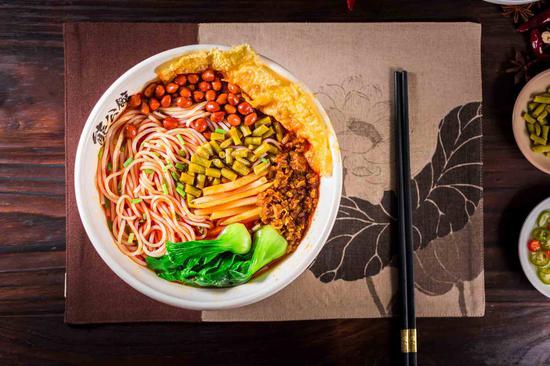Chongqing promoting sales of western produce

Luosifen is made by boiling pickled bamboo shoots, dried turnips, fresh vegetables and peanuts in a spiced river snail soup. (Photo/China Daily)
The smell of snail rice noodles, or luosifen, an iconic dish in Liuzhou, Guangxi Zhuang autonomous region, has attracted many visitors to the region's newly opened booth at the Western China Poverty Alleviation Products Trading Center in Chongqing.
Zhu Yi and his team from Guangxi Rural Investment Group have turned the booth into an exhibition promoting Guangxi's natural scenery, culture and agricultural products, including luosifen.
"Our company focuses on helping local farmers develop their industry and brands," Zhu said. "This trading center is an ideal place to introduce Guangxi delicacies to more people."
The center, which opened in downtown Chongqing in October, is one of the innovative measures the municipal government introduced to reduce poverty by encouraging the consumption of products and services from poor areas in western China.
Though China has eradicated extreme poverty across the country, lifting some 55 million rural residents out of that dire situation over the past five years, there is a possibility that some may slip back into poverty due to misfortunes.
Local governments have been given a five-year transition period to consolidate the achievements they have made in poverty alleviation and pave the way for the drive to comprehensively vitalize rural areas, according to the central government.
"Chongqing, as the only municipality in western China, should take the leading role in reducing poverty through consumption," Liu Guizhong, director of the Chongqing Poverty Alleviation Office, said at the opening ceremony of the trading center.
All 11 underdeveloped western provinces and autonomous regions, as well as the 33 districts and counties in Chongqing are welcome to showcase and sell their agricultural products at the center, which is equipped with conference rooms, live broadcasting studios, storage and distribution centers.
In the past five years, most farmers in poor areas have been lifted out of poverty by growing cash crops. But they face challenges in logistics, sales and branding, said Wang Lisheng, president of the center.
"Our center can provide a comprehensive business solution for the farmers and help them develop sustainably," he said. "So far, we can offer over 10,000 kinds of products with good quality, reasonable prices, nice service and a comfortable shopping environment."
The center has attracted both local consumers and tourists with its wide range of quality products recognized by national poverty alleviation authorities.
"It is a reliable place to buy agricultural products," said Gao Yuanyuan, a housewife who often purchases frozen beef and lamb at the Inner Mongolia autonomous region booth.
"The meat here is very good and reasonably priced," she said. "I also feel happy that my purchase can really help the farmers."
Chongqing launched a project to encourage consumption last year to boost sales of products from poor areas in an effort to promote poverty alleviation.
In addition to building the trading center, it now has over 1,300 vending machines supplying such products and has set up designated online shopping platforms. The total sales of poverty alleviation products amounted to about 4.3 billion yuan ($656.4 million) last year, according to the municipal government.
